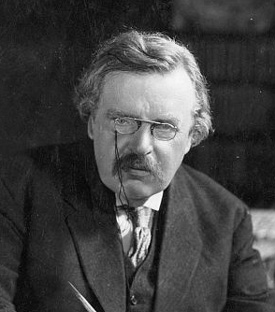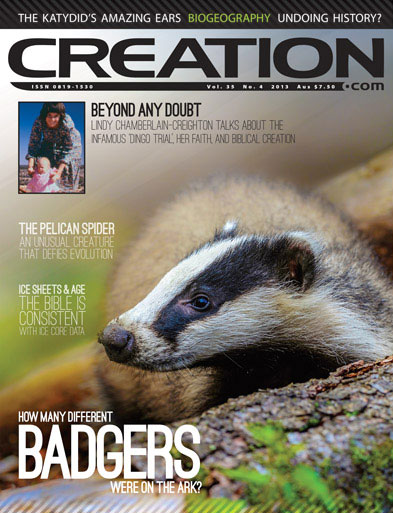The illogic of anti-creationism
Editorial

Credit: Wikipedia.org
Over a century ago, astute anti-Darwinian apologist G.K. Chesterton1 (1874–1936) explained what had returned him “back to orthodox theology.”2 Surprisingly, the culprits were the leading christophobes of his day. Their attacks on Christianity were so irrational that they contradicted each other:
“As I read and re-read all the non-Christian or anti-Christian accounts of the faith … a slow and awful impression grew gradually but graphically upon my mind—the impression that Christianity must be a most extraordinary thing. For not only (as I understood) had Christianity the most flaming vices, but it had apparently a mystical talent for combining vices which seemed inconsistent with each other. It was attacked on all sides and for all contradictory reasons. No sooner had one rationalist demonstrated that it was too far to the east than another demonstrated with equal clearness that it was much too far to the west.”
On the one hand, they ‘proved’ Christianity was “a thing of inhuman gloom”, but then they proved that Christianity “was a great deal too optimistic.” Christianity supposedly caused overpopulation by “Go forth and multiply” (Genesis 1:28), but then it was supposedly anti-sex. Another of Chesterton’s examples was:
“Or, again, certain phrases in the Epistles or the marriage service, were said by the anti-Christians to show contempt for woman’s intellect. But I found that the anti-Christians themselves had a contempt for woman’s intellect; for it was their great sneer at the Church on the Continent that ‘only women’ went to it.”
So Chesterton concluded that either Christianity was very wrong indeed, if mutually incompatible objections can be hurled at it—or it was the one right belief system with the proper balance.
We see the same attacks today against consistent Christianity—creation as Christ proclaimed.3 For example, creation is ‘unscientific’ because “the basic proposals of creation science are not subject to test and verification.”4 But in the same breath, the critics tell us “scientists from many fields have examined these ideas and have found them to be scientifically insupportable.” But how could creation have been “examined” (i.e. tested) if its ideas are “not subject to test”?4 Also, atheists claim that we should accept only scientifically testable claims—but that claim is not scientifically testable.
On this line, many evolutionists claim that no true scientist believes in biblical Creation or doubts goo-to-you evolution. Creationists often counter with someone with high scientific qualifications and important contributions to science who does believe in creation and disbelieves evolution (such as Dr Ainsley Chalmers, pp. 35–37). But then the evolutionist iterates, “But no true scientist doubts evolution”, which even deserves the name, the “No True Scientist Fallacy”.
Then evolutionists accuse creationists of ‘lying’, without evidence. Yet they go on to proclaim that lying is the result of evolution (see “Lying and more as a survival strategy”, pp. 16–18). Many evolutionists also claim that all belief systems should be explained by evolutionary survival, so we can dismiss their truth claims. But then, their own evolutionary belief system should also be explained by evolution, not by its own truth claims.
Evolutionary belief leads to contradictions of its own: we evolved by survival of the fittest, in a ruthless struggle for existence, eliminating our competitors. But then we should care for endangered species—who are our losing competitors (see “Answering fool’s folly”, pp. 14–15).
As Creation magazine prepares to enter its 36th year, we can look back on its years of exposing evolutionary contradictions and defending Christianity. As we look forward, we pray that it continues in this task in the 100+ countries it goes to.
References
- Cosner, L., G.K. Chesterton: Darwinism is ‘An attack upon thought itself’, J. Creation 23(1):119–122, 2009; creation.com/chesterton. Return to text.
- Chesterton, Orthodoxy, ch. 6, ‘The Paradoxes of Christianity’, 1908. Return to text.
- Wieland, C., Jesus on the age of the earth: Jesus believed in a young world, but leading theistic evolutionists say He is wrong, Creation 34(2):51–54, 2012; creation.com/jesus-age-earth. Return to text.
- Teaching about Evolution and the Nature of Science, p. 55, National Academy of Sciences, 1998; see refutation, Sarfati, J., Refuting Evolution, ch. 9, 1999–2012. Return to text.




Readers’ comments
Comments are automatically closed 14 days after publication.